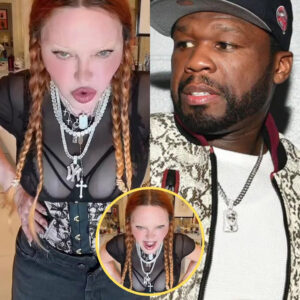Eminem cited his 2009 album Relapse as “the first time that I had fun recording in a long time”
:max_bytes(150000):strip_icc():focal(999x0:1001x2):format(webp)/eminem-9722-117a790635e84f3baef2f3a827549341.jpg)
Eminem. PHOTO: AXELLE/BAUER-GRIFFIN/FILMMAGIC
Eminem’s near-fatal drug overdose in 2007 was a wake-up call that not only inspired him to get sober, but pushed him to have “fun with music again” for the first time in years.
In an appearance on the new episode of Paul Rosenberg’s Paul Pod podcast Thursday, Eminem, 49, and Rosenberg, his longtime manager, recalled the rapper’s recovery from the overdose, which the pair agreed he almost did not survive.
Eminem has been sober since April 20, 2008, according to a 2020 Twitter post, and made his 2009 album Relapse during the early days of recovery. During the interview, the star said that as he returned to music, he felt that things were “new to me again.”
“I remember when I first got sober and all the s— was out of my system, I remember just being, like, really happy and everything was f—g new to me again,” he said about making the album. “It was the first album and the first time that I had fun recording in a long time.”
“It was like the first time I started having fun with music again, and re-learning how to rap, you remember that whole process,” Eminem added. “It took a long time for my brain to start working again.”
Eminem, whose real name is Marshall Mathers, recalled Rosenberg asking his doctors whether the rapper may have suffered permanent brain damage as he learned to make music and rap while sober for the first time in years in the wake of his overdose.
“Didn’t you ask the doctors when I started recording new s—, when I first started rapping again, and sent it to you, didn’t you say, ‘I just wanted to make sure he didn’t have brain damage?’ ” he asked.
Rosenberg confirmed that at the time he was concerned about whether Eminem would have “permanent problems” as he recovered. The pair cited an unreleased song called “Detroit Basketball” that leaked at the time as an example of the kind of work Eminem produced immediately after his recovery that created some cause for concern.
“Nobody was pushing you, you were just finding your way and doing it slowly, but a record that leaked out, that ‘Detroit Basketball’ record, it wasn’t good,” Rosenberg said.
Eminem agreed: “It was f—g weird, because as my brain was turning back on, I started going over lines like ‘Wait, that’s not good.’ If you remember, I don’t know which version leaked, but if you remember, there were like, 20 versions of that s—.”
While there was apparently some initial cause for concern, Rosenberg said it did not take long overall for Eminem to get back into a creative groove, citing a period of “five or six months total.”
Eminem recalled recording in Florida as he was still in withdrawal after his overdose and said he was taking “75-80 valium a night” while he began work on Relapse.
Rosenberg recalled the Relapse track “Underground” as one of his favorites on the album and evidence that Eminem was “spitting like you were back at the hip-hop shop.”
While Eminem recalled realizing that Relapse did not sound or feel like his earlier work as he moved on from the 2009 release, Rosenberg asked the rapper to clarify whether there is an unreleased second Relapse album for some fans who have mythologized a follow-up to the project.
:max_bytes(150000):strip_icc():focal(999x0:1001x2):format(webp)/eminem-and-manager-paul-rosenberg-9722-d5c0cdd63c464aec8b2753d686a84e38.jpg)
PAUL WARNER/WIREIMAGE
“I mean, there’s probably enough to make another Relapse 2,” Eminem said. “There are a lot of songs still that did not leak out from Relapse.”
“There might be [enough songs] but they’re terrible songs,” he added, clarifying there is no second Relapse project. “If they didn’t even make the album on Relapse and I feel how I feel about Relapse, then that should tell you something.”
Eminem opened up about his accidental overdose to The New York Times in 2011, and said his addiction was at one point so bad that he was taking up to 20 pills a day. He has since replaced “addiction with exercise,” he told Men’s Journal in 2015.
The rapper has stayed busy since putting out Relapse, and has released a steady stream of albums since, including Recovery in 2010 and his most recent, Music to Be Murdered By, in 2020.
In August, he announced a greatest hits album called Curtain Call 2, which will feature Rihanna and Beyoncé, and also joined Snoop Dogg on stage at the MTV Video Music Awards. Upon receiving his first Emmy Award last week for his appearance at the Super Bowl halftime show, he became just a Tony Award win away from the prestigious EGOT status.
If you or someone you know is struggling with substance abuse, please contact the SAMHSA helpline at 1-800-662-HELP.
News
Fan Runs Up on 50 Cent While Performing and Gets Tackled by Security Read More: Fan Runs Up On 50 Cent While Performing, Gets Tackled by Security – XXL | https://www.xxlmag.com/50-cent-fan-tackled-security/?utm_source=tsmclip&utm_medium=referral
50 Cent was charged at by an overeager fan during a recent show in Chicago, but luckily security was able to intervene before he got too close to…
Madonna reacted strongly to 50 Cent calling her ‘ma’am’ and criticizing the lip-syncing video
Madonna was spotted jetting into the Big Apple on Sunday, several days after 50 Cent reignited their feud. The pop icon, 64, was bundled up in a black down…
Rick Ross Gets At 50 Cent For Tying Diddy To 2Pac’s Murder
50 Cent has been tying Diddy to 2Pac’s murder ever since Keefe D was arrested for it last month. Rick Ross has a problem with this, and he called…
50 Cent looks back on his pre-fame days in a decrepit house and torn shirt
50 Cent has been a superstar ever since his 2003 debut album Get Rich Or Die Tryin’ sold 872,000 copies in its first four days, but his latest post sees…
Ed Lover Says 50 Cent Is “Stepping Over The Line” With His Endless Diddy Jokes
Diddy’s recent legal woes have gotten to the point where social media users have coined the phrase “No Diddy” to be used in place of “pause,” and fantasy booked…
‘Scumbag’ 50 Cent slammed for taking money back from a stripper at New York club
The US rapper was enjoying a night at Angels strip club in Queens, New York CRITICISED: US RAPPER 50 CENT FACED A BACKLASHGETTY IMAGES FOR COACHELLAEMMA POWELL7 AUGUST…
End of content
No more pages to load











